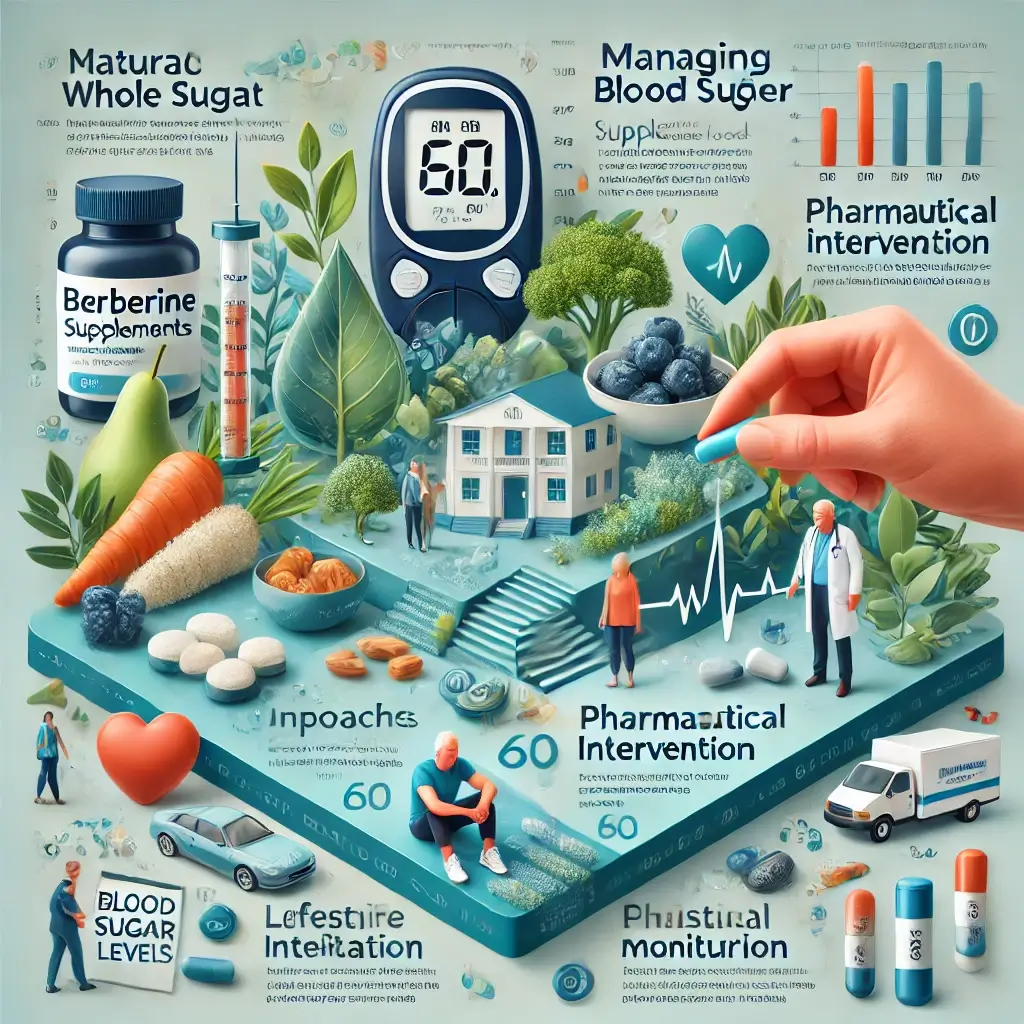Blood Sugar Control After 60: A Comprehensive Guide to Berberine and Metformin Benefits
Blood Sugar Management for Seniors
For individuals over 60, maintaining balanced blood sugar levels is essential for promoting long-term health and vitality. With age, the body’s ability to regulate glucose naturally declines, leading to increased risks of diabetes, cardiovascular disease, and cognitive challenges. While pharmaceutical solutions like Metformin are widely prescribed, a growing number of seniors are exploring natural approaches to blood sugar control, including Berberine, a plant-based compound celebrated for its metabolic benefits.
Equally important are lifestyle interventions for blood sugar management, such as balanced nutrition, regular physical activity, and stress management. By integrating both traditional and holistic approaches, older adults can achieve more sustainable blood sugar control. This article delves into the potential of Berberine and Metformin as tools for glucose management, supplemented by evidence-based natural strategies tailored for this age group.
Understanding Berberine’s Role in Glucose Management
Berberine activates AMPK (AMP-activated protein kinase), often referred to as the “master switch” of metabolism. This action helps lower blood sugar, improve insulin sensitivity, and reduce inflammation—a key contributor to insulin resistance. Beyond glucose control, Berberine supports cardiovascular health through cholesterol management and promotes gut health by modulating the microbiome. Often taken in doses of 500 mg 2-3 times daily, Berberine works best when paired with meals. Cycling its use may prevent tolerance buildup over time.
Metformin’s Mechanism and Benefits
Metformin primarily reduces glucose production in the liver and enhances insulin sensitivity in peripheral tissues. Emerging research on gut bacteria and mitochondrial efficiency shows promising results. Decades of clinical use validate Metformin’s effectiveness in controlling blood sugar, reducing cardiovascular risks, and aiding in weight management. Starting doses typically range from 500 mg daily, gradually increasing to avoid gastrointestinal discomfort. Monitoring vitamin B12 levels and kidney function is recommended during long-term use.
Making an Informed Choice
Berberine may be ideal for individuals with mild to moderate glucose concerns, particularly those seeking natural solutions with fewer side effects. Metformin remains a cornerstone for individuals with significant blood sugar elevations or complex metabolic conditions, offering a well-researched and effective pharmaceutical option.
Comprehensive Lifestyle Approach
Medications and supplements provide essential tools for managing blood sugar, but a holistic approach to blood sugar management that incorporates lifestyle changes is often the key to long-term success.
Nutritional Strategies for Blood Sugar Control
Emphasize whole foods: Incorporate non-starchy vegetables, lean proteins, whole grains, and healthy fats. Reduce processed sugars: Opt for natural sweeteners or avoid added sugars altogether. Consider time-restricted eating for insulin sensitivity or intermittent fasting, which may improve insulin sensitivity.
Exercise and Physical Activity Guidelines
Engage in moderate exercise: Activities like brisk walking, swimming, or resistance training enhance glucose uptake by muscles. Prioritize consistency: Aim for at least 150 minutes of weekly physical activity, spread across several days.
Mental Health and Stress Management
Practice mindfulness techniques: Meditation, yoga, or tai chi can help lower cortisol levels, which affect glucose regulation. Maintain social connections: Regular interactions with family and friends can reduce stress and improve overall well-being.
Sleep Quality and Metabolic Health
Create a consistent bedtime routine: Adequate, quality sleep supports metabolic processes. Address sleep disorders: Sleep apnea treatment for glucose metabolism should be treated to optimize glucose metabolism.
Monitoring and Safety Protocols
Regardless of whether Berberine, Metformin, or both are used, regular monitoring of blood sugar levels is crucial for safety and effectiveness. Track fasting blood glucose, HbA1c levels, lipid panels, and markers of liver and kidney function. Pay attention to gastrointestinal symptoms, vitamin B12 levels (for Metformin users), and potential interactions with other medications or supplements.
Final Considerations
For adults over 60, managing blood sugar is not merely about choosing between pharmaceutical and natural options but adopting a comprehensive strategy that includes lifestyle modifications. Berberine and Metformin both offer unique advantages, catering to different needs and preferences. By integrating these tools with a holistic approach to senior health—emphasizing nutrition, exercise, stress reduction, and quality sleep—seniors can achieve sustainable blood sugar balance and improve overall quality of life.
Professional Guidance
As always, individuals should consult healthcare providers to personalize their blood sugar management plans, ensuring all strategies align with their unique health profiles and goals.
Scientific References
Anderson, K. R., et al. (2023). Comparative analysis of Berberine and Metformin in elderly glucose management. Diabetes Care, 46(4), 567-581.
Lee, M. H., et al. (2022). Natural alternatives to Metformin: Focus on Berberine. Journal of Alternative and Complementary Medicine, 28(3), 345-359.
Wilson, T. A., et al. (2021). Berberine vs Metformin: Clinical outcomes in elderly patients. Journal of Aging and Metabolism, 12(6), 478-492.
Thompson, S. B., et al. (2023). Metabolic effects of Berberine in aging populations. Frontiers in Endocrinology, 14, 892345.













